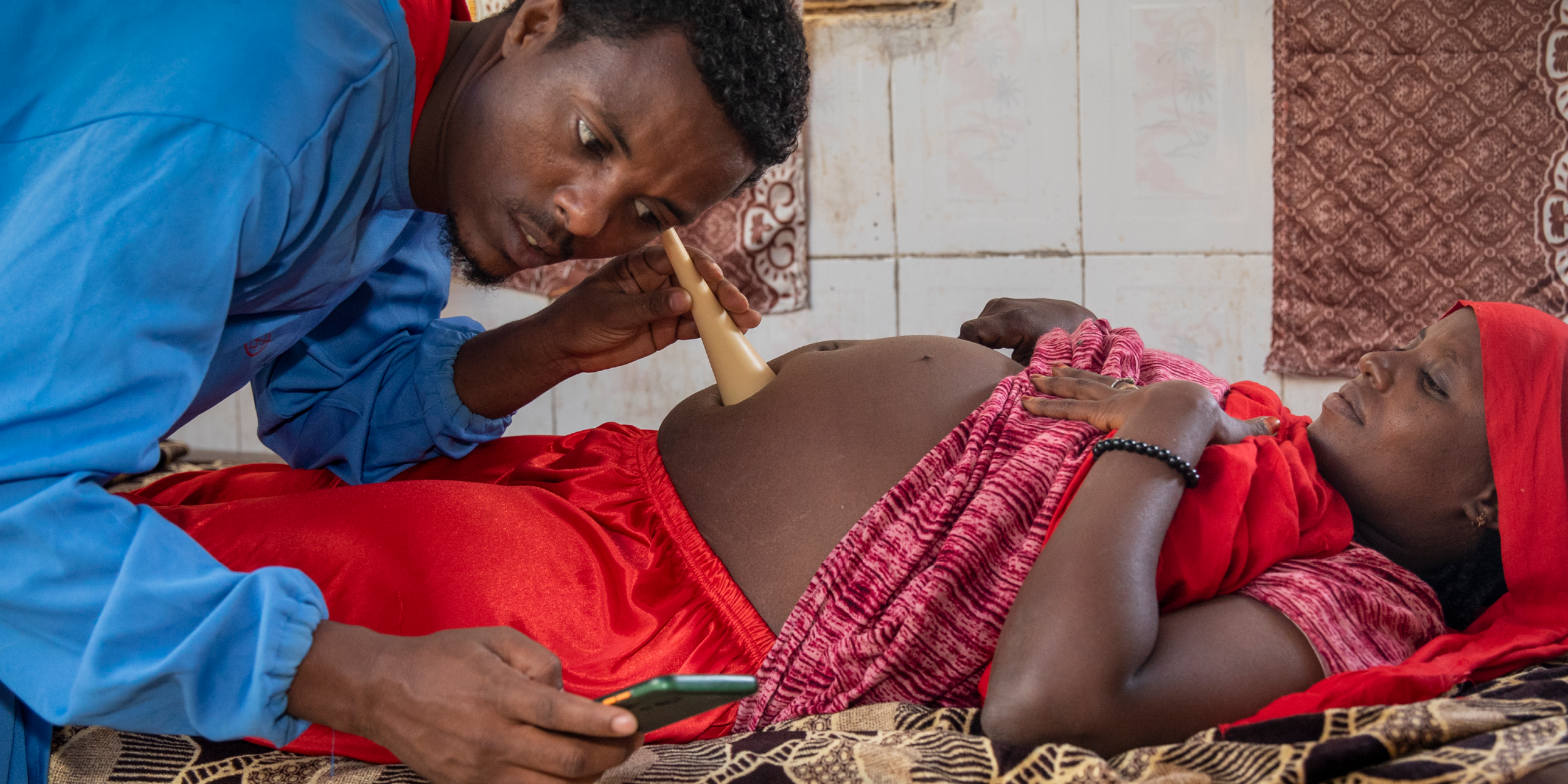Kemal Hassan

- Name Kemal Hasssan
- Country Ethiopia
- Title Midwife
- Organization Referral Hospital, Asayita
Through an innovative mentorship programme, midwife Kemal Hassan helps improve maternal health in Ethiopia
“When mothers and babies are happy, I’m happy too”, says Kemal Hassan when asked what’s the best part of being a midwife.
We meet him at one of the local health centers in Ethiopia’s remote and fragile Afar region. He is here to train some of his midwife mentees before taking on a night shift at the center to support his mentees in providing care for the women coming in to give birth.
Being a midwife is rewarding, Kamal finds, but he is also well-aware that he and his colleagues are operating in a challenging context. Here, in this low-land and desert like landscape, most live as pastoralists, and many are dependent on support from the government to tackle the chronic food insecurity in the area. Over the past years, the Afar region has been affected by the conflict in the northern part of the country, driving up the poverty rate to 30%, further worsening the food security and damaging thousands of healthcare facilities. The maternal mortality rate is high, but Kemal is convinced that it can be reduced.
He is 26 years old and already an highly experienced midwife, working at the referral hospital in Asayita, one of the larger cities in the region. For the past three years, he has been part in Ethiopia’s catchment-based mentorship programme, supported by United Nations Population Fund (UNFPA), UNICEF and Maternity Foundation among other partners. Here, experienced midwives from the referral hospitals mentor new midwives at the smaller health centers to increase the quality of maternal and newborn healthcare provided locally. Because when women are assisted by a skilled birth attendant, the majority of all deaths can be prevented.
“New midwives often lack practical experience. As a midwife mentor, I help identify and fill the gaps in my mentees’ skills and knowledge and together, we help ensure safer births for more women and their babies”, Kemal explains.
Mentorship is practical, continues and linked to real life
Currently, Kemal is mentoring six mentees. Together, they perform practical exercises. Today, they are covering neonatal resuscitation. Previously, postpartum haemorrhage (PPH) and hypertension were on the schedule.
Kemal also supervises his mentees in handling day-to-day cases at the local facilities or over the phone. In that sense, the mentorship programme differs significantly from regular trainings as explained by one of the mentees:
“Other trainings were just showcasing on how to handle different scenarios concerning pregnancy and birth. It was not practical”.
Kemal agrees and adds: “Catchment-based mentorship is linked to real life and offers continued learning. It is good for the mentees as well as the mothers and the babies”.
Building experience and reducing referrals
During a break in Kemal’s training of the mentees, one of them shares the difference she sees in herself after becoming part of the mentorship programme:
“Kemal has changed me. Before I was scared to handle birth complications such as excessive bleeding. I lacked practical experience. But now, after having Kemal as my mentor, I’m work confidently, and we can avoid referring the women to the hospitals”.
Another mentee agrees and adds: “When we can handle birth complications here at the local health centre, then the word spreads and more women will come to our facility instead of giving birth at home by themselves with all the risks it entails.”
Supported by the Safe Delivery+ Programme
The catchment-based mentorship programme is supported by the digital tool, the Safe Delivery App. The app contains guidance on how to handle birth and common complications through simple, animated instruction videos, descriptions of practical procedures, and action cards, among other features. It is free and once downloaded, it also works offline.
Kemal will ask his mentees to go through specific modules in the app before and after the training as well as to complete the app’s MyLearning sessions. Here, the mentees are quizzed on their knowledge and can achieve a formal certification when passing all modules at expert level.
Another advantage of the Safe Delivery App is that it provides access to updated guidelines and can be used as a job aid in addition to a training tool.
“When Kemal or my colleagues are not there, I can always go to app for answers”, mentee Sofia explains.
Maternity Foundation is the organization behind the Safe Delivery App which is part of the overall Safe Delivery+ Programme, combining digital learning with remote or on the ground trainings to build midwifery knowledge and skills. Maternity Foundation also has a set of expert midwife mentors that support other mentors in the catchment-based programme.
The Safe Delivery App is already integrated into Ethiopia’s national guideline on catchment-based mentorship and currently, Maternity Foundation, together with the Ethiopian Ministry of Health and other implementing partners, is exploring how to further streamline and scale the combination of the catchment-based mentorship programme with hands-on practice and the continues learning offered by the Safe Delivery+ Programme.
